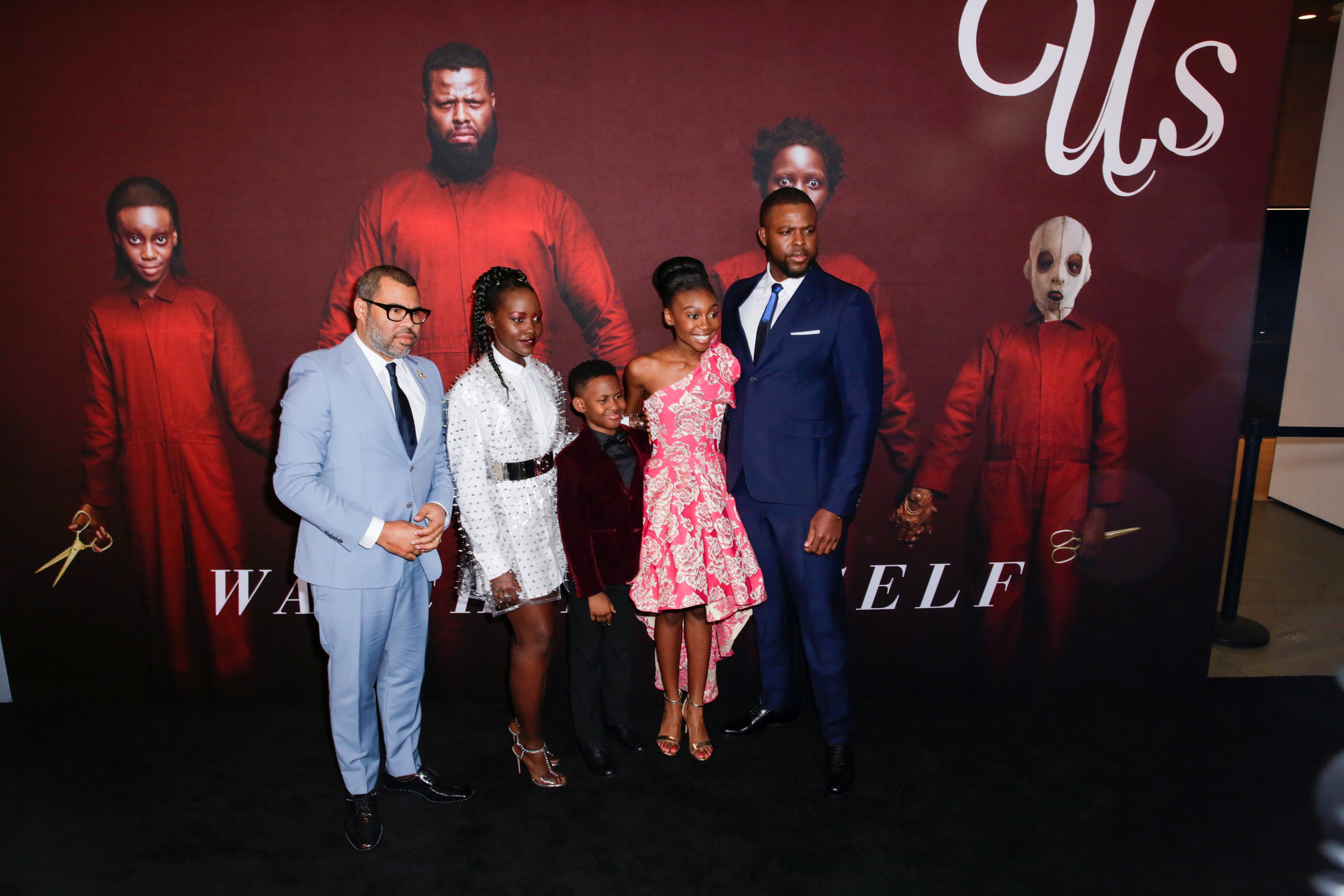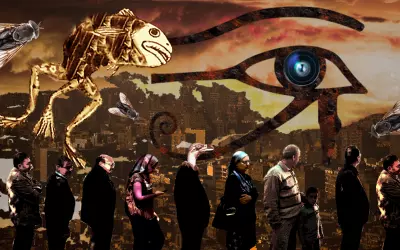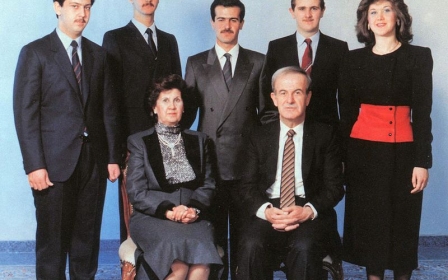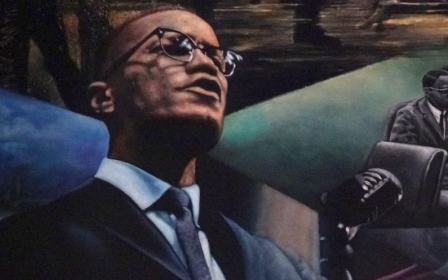What Jordan Peele's film can teach 'Us' about the American empire

“My memory keeps getting in the way of your history.” - Agha Shahid Ali
It starts in a hall of mirrors. And at first, it is not clear why they exist or what their purpose might be. They are just carbon copies of the perfectly normal, wonderful, happy American family. Then they make it clear. They are here to kill.
In the latest film Us, by Jordan Peele, an upper-class African-American family of four are attacked at their holiday house in California by four people who look exactly like them.
The clones, known as the "tethered," are part of a socially engineered community that live in secret tunnels underground. The project, presumably created by the US government, was shut down, and they've lived there ever since; eating rabbits and exercising in an abyss.
The attack on the holiday house and the family is just the start of a revolution from below.
New MEE newsletter: Jerusalem Dispatch
Sign up to get the latest insights and analysis on Israel-Palestine, alongside Turkey Unpacked and other MEE newsletters
Adelaide encounters her doppelganger Red (both masterfully played by Lupita Nyong'o) together with her husband Abraham, daughter Umbrae and son Pluto - all of whom are cardboard cutouts of Adelaide's husband Gabe, daughter Zora and son Jason.
Us is a homage to omnipresent fear of the other that lies at the heart of the American soul
Soon, there is carnage in every home and havoc on the streets of California as the doppelgangers emerge for their time in the sun.
If a zombie film typically shows unhinged and physically deranged animations of the living dead, here the "killers" aren't strangers, they are literally "us" (or rather a darker, more deranged version of "us"). They aren't leeching for the sake of living. They have a motive. We just don't know what.
And given the little we know about the "monsters" attacking the pleasant American family, audiences are put into a bit of a quandary. We want the family to survive the attack, but we aren't exactly sure what they are fighting. We support them anyway.
Omnipresent fear
There has and there will be a deep meditation over the symbolism in Us. Justified as some of the competing interpretations may be, and criticism that the plot is punctured with ambiguities, it will be hard not to walk out of the theatre feeling disturbed.
If anything, a week after watching Us, I am still struck by the extent to which the imagery of one film can evoke a million political allusions. If Peele's first film, Get Out, was a stupendous satire about black lives in an endless story of systemic racial bigotry in America, Us is a homage to omnipresent fear of the other that lies at the heart of the American soul.
In the opening (and terrifying) encounter between the two families, the "clones" are asked: "What are you?" to which they reply: "We are American." The answer cuts to the central tenet of the plot.
As it has become abundantly clear, what it means to be "an American" today for black and brown bodies remains a dubious affair. We are talking about an America that routinely demonises immigrants, has separated families at the border, and still conducts a ban on citizens of several Muslim-majority countries.
The virtuosity of Us is that it is a film about unmasking the indentured lives that hover in the shadow of purported liberty, equality and democracy
But it is not just a question of citizenship. It is also a question of the haves and have-nots.
Today, in Los Angeles county, home to the glitz and glamour of Hollywood itself, 50,000 people are homeless. The multi-million dollar mansions of Sunset Boulevard belie the dispossessed multitude living in tents on the sidewalks of downtown LA, just miles apart.
In Us, the marginalised are kept in tunnels underground and aren't heard or seen. In the real world, the privileged erase the vulnerable through the practise of self-deception. But in both worlds, they only matter once they are a threat.
The cost of subjugation and erasure
This is precisely what makes Peele's intervention in the "horror" genre even more seminal. He unhooks "horror" from the cliche of cheap spectacle. He transports "horror" to the regular - like a sunny day at the beach.
Whereas the genre serves as mere distraction and a form of escape into a world that isn't typically real, Peele opens a window into the black (or the dispossessed or the erased) experience that is a reflection of life itself.
Just as the doppelgangers were created and forgotten, so too, are those who bear the brunt of America's decades-long foreign policies
The more I've thought about the film and its message, the more convinced I am of it as a gambit and lesson of far-reaching political intent. And just as the doppelgangers were created and forgotten, so too, are those who bear the brunt of America's decades-long foreign policies.
Look no further than the US-led invasion of Iraq, which killed hundreds of thousands of people and left a country in ruins. It has been 16 years. In the US, you wouldn't know it unless you wanted to remember.
And while much of the discussion of Us has revolved around the horror of America's past - be it the genocide of the Native American population, settler-colonialism, slavery, white supremacy - this is not a parable unique to America. Entire histories of the modern world have come at the cost of subjugation and erasure of people placed at the margins.
Consider how the Western media continues to patronise the African continent, or how it fuelled xenophobia during the refugee crisis in Europe.
I keep on thinking about its resonance with the erased everywhere, specifically Palestine and particularly Gaza. More often than not, Palestinians are stripped of their voice, context, history and humanity. The blockade of Gaza, the open-air prison, the lack of basic essentials, forgotten each time a rockets stutters into Israel.
The truth that hurts
And just as we discover in Us that Adelaide forgets that she was originally created underground, and had forcibly switched places with her doppelganger as a little girl years earlier (making her an "imposter") so too do we conveniently forget the truth that "hurts" or "belittles" our moral sense of self.
In other words, Gaza remains a living hell because Israeli lies about Palestinians, the occupation and its history, have become so fundamentally pathological, it is close to impossible to admit otherwise. It is this act of wilful (and unethical) amnesia that forms the backbone of the obfuscation of Palestinian rights.
The modern history of the Middle East, or just about any part of the former colonised world, exemplifies this notion of willful Western amnesia, too.
Whereas Gaza is supposedly a blot on the conscience of Western democracy, Peele's decision to cast a black family as the co-conspirators of a larger American amnesia towards its history could be reasonably read as indictment on privileged black and brown people as well and their service to self and empire.
This resonates with countries who say they have rid themselves of the shackles of colonialism. Countries like Ghana and Kenya, Egypt and India comprise of one long bottleneck of elites building personal wealth through the erasure of others, presumably, their own. The appropriation of struggle heroes like Nelson Mandela and Martin Luther King has only served to deepen pockets and maintain the status quo.
Perhaps predictably, years after apartheid ended in South Africa, unequal access to land remains the biggest question in the country. Years after the civil rights movement, the biggest obstacle to the Movement for Black Lives is still white supremacy.
The virtuosity of Us lies in its intent to unmask the indentured lives that hover in the shadow of purported liberty, equality and democracy. But it leaves the burden of its message completely in the eyes of the beholder. Watch yourself.
The views expressed in this article belong to the author and do not necessarily reflect the editorial policy of Middle East Eye.
Middle East Eye delivers independent and unrivalled coverage and analysis of the Middle East, North Africa and beyond. To learn more about republishing this content and the associated fees, please fill out this form. More about MEE can be found here.







